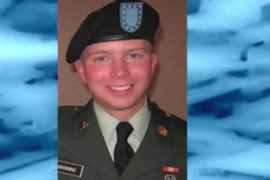
Bradley Manning has been indicted by the United States government for exposing war crimes being committed in Iraq by the Pentagon. He is being used as a scapegoat for the failure of the U.S. in the war., a photo by Pan-African News Wire File Photos on Flickr.
Bradley Manning pleads guilty to 10 lesser charges, explains motive
By Julie Tate, Updated: Thursday, February 28, 2:48 PM
The Army private charged with the biggest leak of classified material in U.S. history pleaded guilty to 10 charges Thursday, saying he acted to start a debate over a U.S. foreign policy obsessed with “killing and capturing people.”
Pfc. Bradley Manning, 25, entered guilty pleas in a hearing at Fort Meade before Col. Denise Lind, the military judge in charge of his trial. Manning still faces more serious charges, including aiding the enemy and espionage.
“I believed that if the general public, especially the American public, had access to the information . . . this could spark a domestic debate over the role of the military and our foreign policy in general,” Manning said in a statement that he read while seated next to his lawyers in court.
Manning turned over hundreds of thousands of classified cables, military incident reports and other documents to the anti-secrecy group WikiLeaks. The group and its founder, Julian Assange, publicized the material worldwide. At the time, Manning was a low-level intelligence analyst at an Army base outside Baghdad.
U.S. officials have said the leaked information exposed intelligence sources and embarrassed key officials of foreign governments. Intelligence assessments of the damage caused by the leaks will not be presented until the sentencing phase of Manning’s court martial.
In a plea with prosecutors, he will serve 20 years for pleading guilty to the 10 lesser charges covering misuse of classified information. He pleaded not guilty to more serious charges of espionage and aiding the enemy, which could send him to prison for life. He is scheduled to stand trial on 12 remaining charges in June.
Manning described his motives in a 35-page statement that he read briskly in court. Thin and bespectacled, he paused occasionally to sip water but maintained his composure as he explained how he decided to leak the material and how he connected with Assange.
While working at a forward operating base outside Baghdad, Manning read diplomatic cables and other material on a classified government network. The cables contained often blunt and sometimes uncomplimentary assessments by U.S. diplomats of officials in dozens of foreign countries.
Manning said he was fascinated by what the exchanges revealed about U.S. interactions with other countries. “The more I read the cables, the more I came to the conclusion that this type of information should become public,” he said.
Manning said that he downloaded hundreds of documents to a disk that he carried back to the United States while on leave in January 2010. Intending to leak the material, he said he telephoned The Washington Post, where he spoke to an unidentified reporter. He said that he did not provide details and that the reporter didn’t appear to take him seriously. He said he also left a message on the phone of the public editor at the New York Times. The Times did not return his call, Manning said.
But he soon found his outlet. In February 2010, Manning said he submitted the first set of leaked documents to the WikiLeaks Web site. He said he had been impressed with the group’s efforts to expose U.S. military and diplomatic operations.
Manning said he also struck up a relationship in Internet chat rooms with Assange, the flamboyant founder of WikiLeaks. He said Assange never pressured him to provide the thousands of pages of cables, Army logs and other material that Manning downloaded from secure computers and transferred to WikiLeaks. “I take full responsibility,” he said.
He said he did not believe the cables would damage the United States, “but I thought they might be embarrassing.”
WikiLeaks published the first batch of material from Manning on Feb. 18, 2010. Later that year and into 2011, hundreds of thousands of cables dealing with diplomatic relations between the United States and other countries from late 1966 to February 2010 were published in newspapers worldwide and posted by WikiLeaks on its Web site.
Manning was arrested in Iraq in May 2010 after he was identified as the leaker by a former hacker in whom the young soldier had confided over the Internet. He was later transferred to the military jail at Quantico, where his lawyers say his long solitary confinement was abusive.
No comments:
Post a Comment